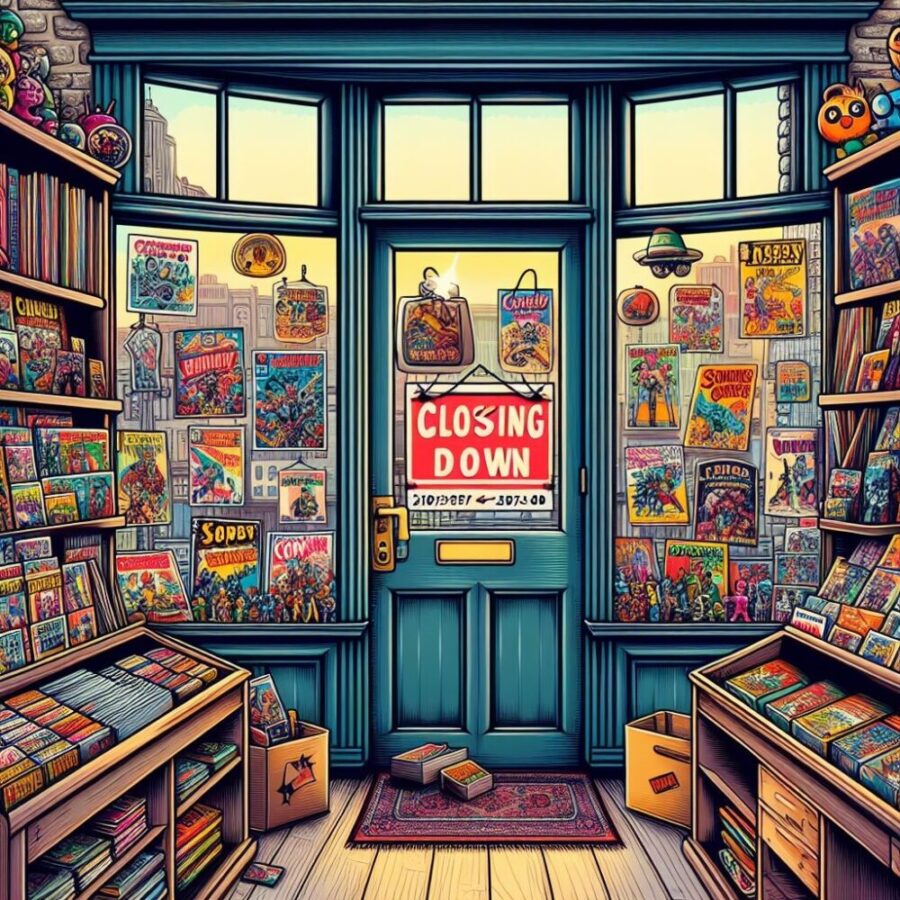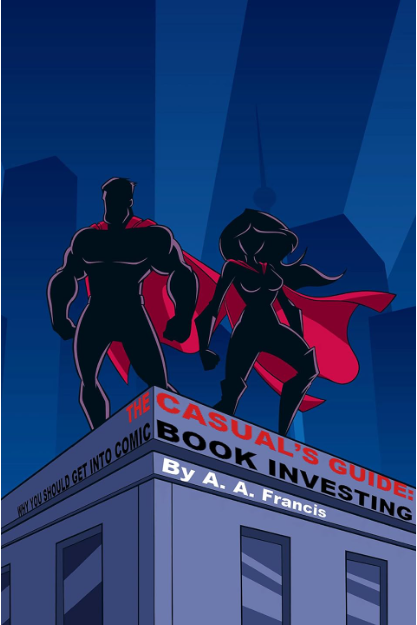10 Harsh Economic Realities of Launching Your Own Comic Book

DALL-E
Creating a comic book is a thrilling endeavor that allows creators to bring their imaginative comic book worlds to life. However, the economic realities of launching your own comic book can be a humbling humbling experience like Superman encountering a piece of kryptonite.
Modern comic book fans don’t read or buy comic books like previous generations did before them. Modern comic book stores are struggling in an evolving direct market, the main distribution system when comic books are sold in stores. The advent of digital comics has shifted the business strategy of how comic books are marketed and sold.
The harsh economic realities of launching your own comic book are something many creators don’t consider until it is too late. It’s essential to recognize that along with the creative joy, there are financial challenges you will face. No one is suggesting you don’t try, but you should be well-informed. Here are 10 key drawbacks new comic book creators should know before starting.
1. Digital Comic Books

DALL-E
One of the harshest realities of launching your own comic book in the digital age is that the demographic of digital comic book readers is large and growing. Over 22% of all comic book sales are digital. Many online retailers have convenient apps that offer users access to digital comic books from hundreds of publishers. Many readers visit online sites that offer free access to pirated, scanned, digital comics. How will your business model compensate for this reality, especially if your goal is to sell physical copies?
2. Modern Comic Book Pop Culture

123RF
A big reality buzzkill of launching your own comic book now is the fact that most modern comic book fans don’t actually read comic books. The rise of the MCU, comic book-adapted films, TV shows, video games, and cartoons has created a hype-driven comic book culture where most of the fans don’t need to read comic books to be a fans.
80% of comic book film fans are called “normies,” or “casual,” because they don’t read comic books. Modern comic book publishers relaunch long-running comic book series with new “#1” issues to entice normies who may be intimidated by buying issue #1087 of a series. Comic book films influence comic book stories now as advertising more than the other way around. What is your plan to reach this demographic?
3. Comic Book Store Closings

DALL-E
Two of the oldest comic book stores in Los Angeles closed down in 2023. Large comic book stores all over the country with storied local histories have been closing down for several years now. Critics blame the recent pandemic, inflation, shifting consumer demographics, and more, but it is a stark reality you must be aware of. How will you consider this factor when launching your own comic book?
4. What is Your Demographic?

DALL-E
Before you even consider launching your own comic book you should ask yourself, “Who is going to buy it?” Why would anyone buy your comic book in a crowded marketplace where 80% of the publishers are corporate entities with massive global influence? How will you reach brand-loyal, hardcore comic book fans or normies who don’t read comic books? You should have a detailed business plan that answers these questions and more before trying to launch.
5. Comic Book Fans Don’t Like The Industry

DALL-E
Avid comic book fans who actually buy comic books complain about the modern industry often. The average price of a modern comic book ranges between $4 to $5. Comic book fans complain that comic book prices are too high, story and art quality has degraded precipitously over the years, and companies focus on publishing too many titles simultaneously in a quantity-over-quality business mindset.
Comic book fans also feel ignored and taken for granted as companies focus on luring in “normies,” and demographics who don’t read comics but love comic book-adapted entertainment. How will you reach a cynical comic book fanbase after launching your own comic book?
6. Modern Publishers Want to Copy the MCU Model

123RF
Are you launching your own comic book series or company independently? If you try to submit your comic book to a publisher, the publisher will have the final say on conditions and acceptance. You may have to compromise your original vision to get a foot in the door. It must be noted that many publishers are looking for IPs to leverage into film adaptations like the MCU.
In other words, not many large-scale corporate publishers are just looking to be in the comic book business within itself. Many publishers want to make money via film, TV, video games, or cartoon adaptations, not just sell comic books in an industry where comic book stores are closing and most comic book pop culture fans don’t read comic books.
7. Hiring as an Indie Startup is Expensive

123RF
Assembling a team of skilled professionals—writers, artists, editors, and letterers—requires substantial financial investment. Their expertise is crucial for crafting compelling narratives and visually stunning artwork. But quality work does not come cheap. It might cost you anywhere between $5,000 to $12,500 to produce one comic book issue. Most comic book creators lose money when launching their own comic book as an independent startup.
8. What is Your Business Model?

123RF
Will you focus on publishing physical comic books, digital comic books, or a hybrid model? What genre will be your focus on, superheroes, horror, fantasy, anime, or third-party IP licensing? Can you project how many physical and digital copies you can sell monthly? Profit is only generated when expenses and bills are subtracted from any revenue you earn.
You then have to consider advertising, marketing, printing, shipping, and other miscellaneous costs. Launching your own comic book will not be easy, but it will be relatively easier than establishing your brand convincingly in the marketplace.
9. Distribution

123RF
Aspiring music artists used to sell cassettes and CDs out of their car trunks or at shows in the 1980s and 1990s before the music industry business model changed forever as music became primarily digital. How are you going to distribute your physical comic book in existing comic book shops? You can launch your comic book online tomorrow, how will you attract a demographic?
Many comic book creators use distribution services like Diamond. Diamond has a monopoly on the comic book distribution industry, and you have to operate on its terms. You must seriously brainstorm how you will get your comic book on the market in a realistic way in a very unfair and monopolistic business market.
10. Copyright, Contracts, and Legal Issues

123RF
The creators of Superman, Jerry Siegel and Joe Shuster, sold the character without legal counsel to DC Comics in 1938 for $130. That’s the modern equivalent of $2,860 that had to be shared by two creators for a character who has generated billions in revenue for DC since. Siegel and Shuster legally fought DC for the rest of their lives to regain the Superman copyright, a legal fight their heirs and estates are still fighting to this day.
This example of fierce copyright disputes between creators and publishers is far from the only one. Retain legal counsel to develop strategies for protecting IP copyrights, draw up contracts for independent contractors, and decide how you will assign “creator,” credits. Pay for a good attorney to protect your copyrights now so you don’t end up like the Superman creators later.
Before Launching Your Own Comic Book

123RF
Creating a comic book series is an artistic labor of love, but it’s essential to approach it with a mindset of financial, legal, and market awareness. Budgeting, strategic planning, and understanding industry dynamics are vital for navigating the many drawbacks of launching your own comic book.
Consult with a lawyer and financial advisor before launching a comic book. Talk to fellow creators who have done it before. No one is trying to discourage you from trying but always go into any business endeavor with your eyes open and well-informed.
Read More
Don’t Buy These 13 Items From Trader Joe’s
You Buy Counterfeit Foods All the Time: 8 Fake Foods You Love To Eat

Allen Francis is a full-time writer, prolific comic book investor and author of The Casual’s Guide: Why You Should Get Into Comic Book Investing. Allen holds a BA degree from Marymount Manhattan College. Before becoming a writer Allen was an academic advisor, librarian, and college adjunct for many years. Allen is an advocate of best personal financial practices including saving and investing in your own small business.




